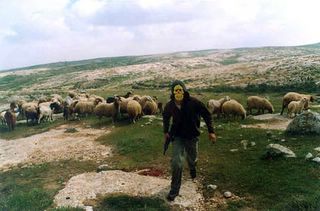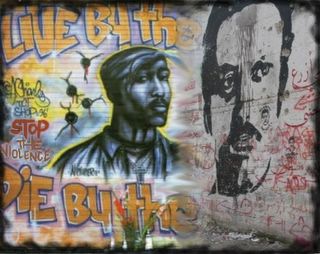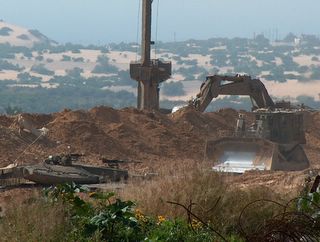
On the International Day of Action Against Caterpillar (April 13), a CAT D9 Armored Bulldozer works alongside an Israeli Merkava tank and other heavy equipment on the route of the Wall in Rafah.
There are some things that make you yearn for the friendly confines of the Bethlehem ghetto. As Israel surrounds Bethlehem with a Wall (a Wall of Segregation, a Wall of Apartheid, a Wall of Annexation) Israel's bulldozers and cranes are also active in other areas. This week I was in Rafah in the Gaza Strip. Rafah is like another world - a horrifying, sad and dangerous world. Less than 300 meters from my friend's home in the Yebna Refugee Camp, an Israeli tank guarded a bulldozer, crane and other heavy equipment erecting additional sections of Wall between Palestinian Rafah and Egyptian Rafah.
The Wall in Rafah is constructed on Palestinian land that was once covered by the homes of Palestinian refugees. The land is now a sinister wasteland, patrolled by Israeli Merkava Tanks and Caterpillar D9 Armored Bulldozers. Sniper towers loom over the Wall, dominating the area and shooting anyone who approaches. On April 9, three Palestinian children were shot and killed when they ventured too far into this "buffer zone."
According to the Rafah Municipality, Israel has demolished approximately 4,000 Palestinian homes in Rafah since October 2000. An additional 1,500 homes have been partially demolished and more than 10,000 damaged. Around 7,000 individual Palestinian families in Rafah have lost their homes and 5,000 more families have been forced to leave their houses. The rest of Rafah wait nightly for their homes to follow suit.
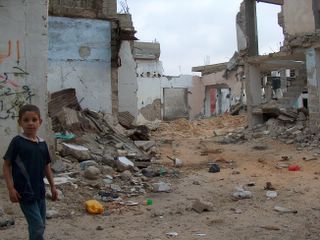
Demolished homes and shops in the Al Brazil neighborhood of Rafah Refugee Camp. These ruins remain from a large-scale Israeli incursion in May of 2004 - one of many invasions of Rafah last year.
Residents of Rafah have lost approximatly $24 million worth of agricultural land to Israeli bulldozers and the municipality estimates damage of up to $16 million to roads and public infrastructure as a result of repeated Israeli invasions. There is little work in Rafah and 80% of the population is unemployed. Every man, woman and child is traumatized. It is painful to see anywhere, but especially in the children who struggle to sit still, their eyes darting from side to side, frantically waiting for the "jaysh" (Israeli soldiers) to come.
Over the past two years I have had the honor of spending several nights with friends in Rafah. There is never a night in Rafah that the town does not face a barrage of heavy caliber gunfire from Israeli tanks and sniper positions. The army sets nightly explosions underground and in homes in the buffer zone- systematically clearing more land and terrorizing the town.
Returning to Bethlehem, I walked through the checkpoint and entered the ghetto through the narrow gap in the Wall that now severs the once bustling road between Bethlehem and Jerusalem. The Wall in Bethlehem is choking the city, killing the economy and imprisoning the people in a ghetto - but it could be worse.
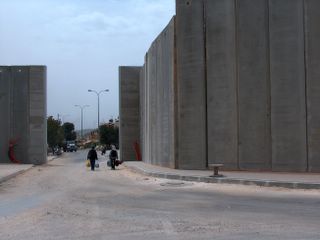
The northern entrance to the Bethlehem ghetto. . . home sweet home.
For more information and updates from Rafah see Rafah Pundits and Rafah Today.
For more information on Caterpillar Bulldozer sales to Israel see the Electronic Intifada CAT Focus and the CAT Campaign website by A Jewish Voice for Peace.
